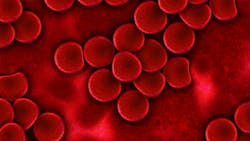Doctors identify cytokines that could predict COVID-19 disease severity
Researchers at University of Virginia (UVA) School of Medicine identified cytokines that could predict patients with COVID-19 who are at greatest risk of severe illness and to pinpoint those most likely to need a ventilator.
The UVA scientists found that the levels of a particular cytokine in the blood upon diagnosis could be used to predict later outcomes. Cytokines – proteins produced by immune cells – are responsible for severe overreactions by the immune system, known as cytokine storms, associated with COVID-19 and other serious illnesses.
Cytokine storms, in which the immune system spirals out of control, are typically associated with an established group of cytokines. But in this study, the best predictor of COVID-19 outcomes was an “underappreciated” cytokine more associated with allergies, according to the UVA researchers. High levels of that cytokine, IL-13, were associated with worsened COVID-19 outcomes regardless of patients’ gender, age, or other health problems.
The researchers have shared their discovery on the scientific site medRxiv.org; the findings have not yet been peer reviewed.
To draw their conclusions, the researchers identified 57 COVID-19 patients treated at UVA who ultimately required a ventilator. They then tested blood samples taken from the patients within 48 hours of diagnosis or hospital admission. They compared the results with those from patients who did not wind up needing a ventilator.
The researchers also identified two more cytokines associated with severe outcomes, though the duo had less ability to predict the need for a ventilator. In addition, the researchers found that levels of two other cytokines were significantly higher in patients with elevated blood sugar. This “proinflammatory response,” they say, may help explain why diabetes is associated with worse COVID-19 outcomes. In short, the body is primed to respond too strongly to the infection.
The researchers say additional research is necessary to determine how the cytokines are contributing to COVID-19 outcomes, but they hope the discovery will help doctors improve care for a disease that has now killed more than 125,000 Americans.

